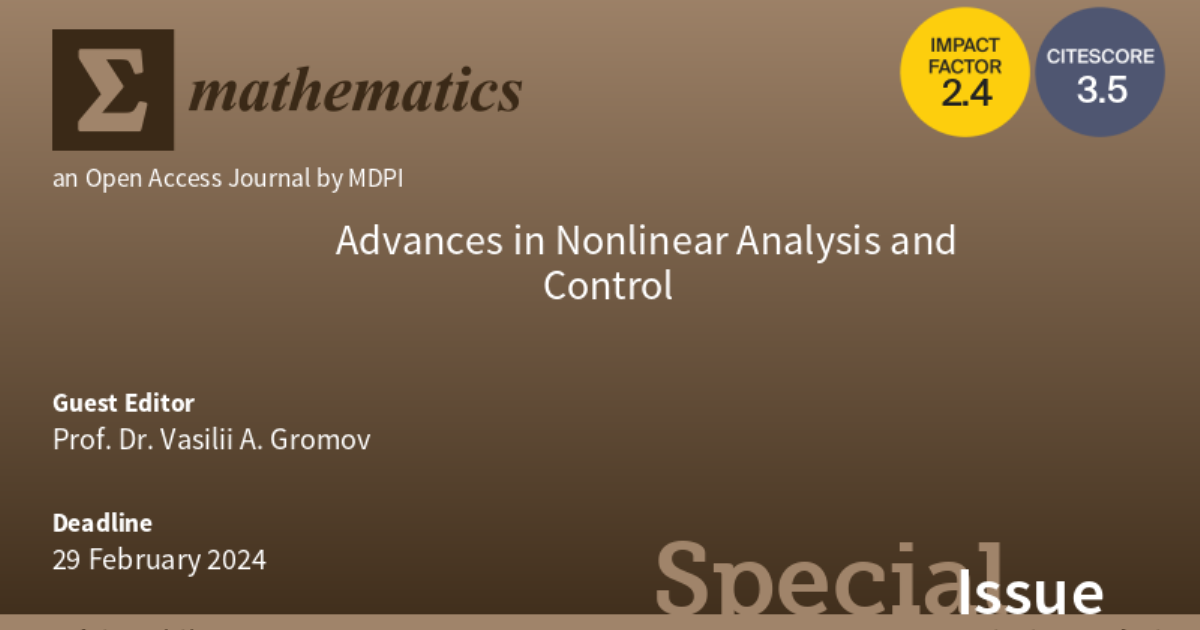Advances in Nonlinear Analysis and Control
A special issue of Mathematics (ISSN 2227-7390). This special issue belongs to the section "C1: Difference and Differential Equations".
Deadline for manuscript submissions: closed (29 February 2024) | Viewed by 4427

Special Issue Editor
Interests: bifurcation theory; non-linear boundary problems for PDEs; numerical methods; complex systems; global models; language as a system; chaotic time series
Special Issue Information
Dear Colleagues,
Ilya Prigogine, a Nobel Prize winner, once said: ‘The world is nonlinear, temporal, and stochastic’. Linear systems tend to be just linearized nonlinear (unknown) ones; we should necessarily verify whether the linearization procedure is adequate for given parameter values.
Nonlinear phenomena are responsible complex for systems behavior. We believe that nonlinearity constitutes the core of complexity, and nonlinear processes, their genesis, evolution, and termination, form the subject matter of this Special Issue.
In the present Issue, we would like to bring together studies on both theoretical aspects and real-world applications of nonlinearity; we are interested in natural and humanitarian science applications. Eugene Wigner, the other Nobel Prize winner, wrote about ‘the unreasonable effectiveness of mathematics in the natural sciences’. We believe that pure and applied mathematics constitute the same field of science, and that complex systems theory bridges the gap between them.
It would be our pleasure to see your papers on complex systems, nonlinear science, self-organized systems, chaos theory, bifurcation theory, catastrophe theory, complexity, numerical methods, global models, nonlinear phenomena in natural and social sciences, language as a complex system, chaotic time series, AI and nonlinear processes, nonlinear control, and ‘nonlinear’ philosophy, to name just a few.
Prof. Dr. Vasilii A. Gromov
Guest Editor
Manuscript Submission Information
Manuscripts should be submitted online at www.mdpi.com by registering and logging in to this website. Once you are registered, click here to go to the submission form. Manuscripts can be submitted until the deadline. All submissions that pass pre-check are peer-reviewed. Accepted papers will be published continuously in the journal (as soon as accepted) and will be listed together on the special issue website. Research articles, review articles as well as short communications are invited. For planned papers, a title and short abstract (about 250 words) can be sent to the Editorial Office for assessment.
Submitted manuscripts should not have been published previously, nor be under consideration for publication elsewhere (except conference proceedings papers). All manuscripts are thoroughly refereed through a single-blind peer-review process. A guide for authors and other relevant information for submission of manuscripts is available on the Instructions for Authors page. Mathematics is an international peer-reviewed open access semimonthly journal published by MDPI.
Please visit the Instructions for Authors page before submitting a manuscript. The Article Processing Charge (APC) for publication in this open access journal is 2600 CHF (Swiss Francs). Submitted papers should be well formatted and use good English. Authors may use MDPI's English editing service prior to publication or during author revisions.
Keywords
- complex systems
- nonlinear science
- self-organized systems
- chaos theory
- bifurcation theory
- catastrophe theory
- complexity
- numerical methods
- global models
- inverse problems
- nonlinear phenomena in natural and social sciences
- language as a complex system
- chaotic time series
- AI and nonlinear processes
- nonlinear control
- ‘nonlinear’ philosophy
Benefits of Publishing in a Special Issue
- Ease of navigation: Grouping papers by topic helps scholars navigate broad scope journals more efficiently.
- Greater discoverability: Special Issues support the reach and impact of scientific research. Articles in Special Issues are more discoverable and cited more frequently.
- Expansion of research network: Special Issues facilitate connections among authors, fostering scientific collaborations.
- External promotion: Articles in Special Issues are often promoted through the journal's social media, increasing their visibility.
- Reprint: MDPI Books provides the opportunity to republish successful Special Issues in book format, both online and in print.
Further information on MDPI's Special Issue policies can be found here.





